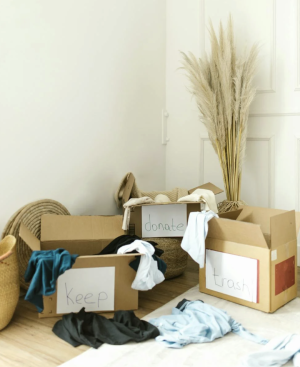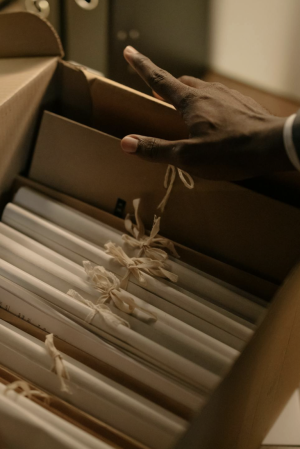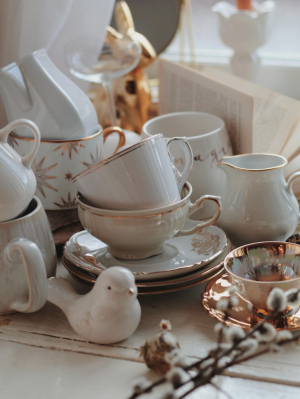The surprising items retirees still hold on to—and why it may be time to let them go
By
Veronica E.
- Replies 0
Retirement is often thought of as a fresh start: no more long commutes, no more endless meetings, and no more strict schedules.
But for many older adults, the physical clutter of decades past still lingers in basements, closets, and attics.
Boxes of keepsakes, unused furniture, and “just in case” purchases can take up not just square footage, but also mental space.
Holding on to too much can make life harder than it needs to be—and cost more than you might realize.
The good news? Lightening the load can free up room, cash, and peace of mind.

Bigger isn’t always better.
Downsizing to a smaller, more manageable home can reduce utilities, property taxes, and maintenance costs, potentially saving thousands per year.
That extra money can be redirected toward travel, hobbies, or building your retirement cushion.
Carrying credit card balances into retirement is like dragging a weight you don’t need.
The average retiree owes more than $7,000 in credit card debt.
Eliminating those balances helps improve financial stability and provides peace of mind.
Monthly storage fees can add up quickly—sometimes costing more than the items inside are worth.
Selling or donating unused items can free you from an ongoing bill and reclaim money for things that matter.
If you haven’t worn it in a year, it’s time to let it go.
Donating gently used clothing makes space in your closet while benefiting someone else.
Unused vehicles still cost money in insurance, registration, and upkeep. Selling off a spare car can clear space and cut ongoing expenses.
Bread makers, fondue sets, or extra appliances often gather dust. Keep only what you use regularly and enjoy a clutter-free kitchen!
Downsizing often means letting go of oversized or excess furniture.
Fewer pieces can make your living space more open and easier to maintain.
If it’s functioning as a coat rack more than a treadmill, it may be time to let it go.
Many Medicare enrollees qualify for gym access through programs like SilverSneakers—no need to keep bulky machines at home.
Invite your children to sort through their old trophies, school projects, and childhood keepsakes.
They’ll enjoy revisiting memories, and you’ll reclaim space.
Libraries, e-books, and audiobooks make it easy to revisit old favorites. Donate or sell books you don’t plan to reread.
Digitize what you can, shred what you don’t need, and keep only the essentials. Paper piles shrink quickly once you start sorting.
If you’re no longer hosting large gatherings, you may not need as many tubs of decorations. Donating seasonal items helps others and clears storage space.
From stamps to Beanie Babies, many collections no longer hold the value once imagined.
Keep a few sentimental pieces and consider selling or donating the rest.
Most people don’t need more than a couple of good suitcases. Donate extras to charity shops or shelters.
If you’re not hitting the slopes or playing league games, consider selling or donating old gear.
Renting is often a smarter choice for occasional use.

A cherished piano may be worth keeping, but that unused guitar can find new life in someone else’s hands.
Display what brings you joy and release the rest. Clutter-free shelves make your home feel calmer!
If you’re no longer shopping for a large family, buy only what you can reasonably use. Smaller purchases save space and reduce waste.
Formal dinnerware often goes unused.
Selling or donating these items can free up cabinets while giving them a second life elsewhere.
Recycle unread stacks of magazines, donate or recycle outdated electronics, and let go of obsolete media like VHS tapes and CDs—unless they hold special sentimental value.
Mismatched socks, old linens, broken board games, and long-expired medications or makeup all fall into the “time to toss” category.
Clearing these out helps create a safer, more organized home.

Decluttering can bring up strong feelings. It’s natural to be attached to things that hold memories.
But letting go doesn’t erase those moments—it simply creates room for new ones.
Taking photos or passing items on to family can help ease the process.
Selling or donating items lightens your load while saving money on insurance, maintenance, and storage.
In some cases, you may even add to your retirement savings with the extra cash.
Decluttering isn’t just about tidying up—it’s about creating a home that feels open, peaceful, and tailored to your current lifestyle.
By letting go of what no longer serves you, you make space for experiences, hobbies, and memories that truly matter.
Read next:

Have you gone through a big decluttering or downsizing? What was the hardest thing to let go of, and what was the most rewarding part of the process? Share your stories and tips in the comments to inspire others on the same journey.
But for many older adults, the physical clutter of decades past still lingers in basements, closets, and attics.
Boxes of keepsakes, unused furniture, and “just in case” purchases can take up not just square footage, but also mental space.
Holding on to too much can make life harder than it needs to be—and cost more than you might realize.
The good news? Lightening the load can free up room, cash, and peace of mind.

Decluttering in retirement can free up both space and peace of mind. Image source: Pexels / RDNE Stock project.
1. Your home—or its size
Bigger isn’t always better.
Downsizing to a smaller, more manageable home can reduce utilities, property taxes, and maintenance costs, potentially saving thousands per year.
That extra money can be redirected toward travel, hobbies, or building your retirement cushion.
2. Lingering debt
Carrying credit card balances into retirement is like dragging a weight you don’t need.
The average retiree owes more than $7,000 in credit card debt.
Eliminating those balances helps improve financial stability and provides peace of mind.
3. Storage units
Monthly storage fees can add up quickly—sometimes costing more than the items inside are worth.
Selling or donating unused items can free you from an ongoing bill and reclaim money for things that matter.
4. Overflowing closets
If you haven’t worn it in a year, it’s time to let it go.
Donating gently used clothing makes space in your closet while benefiting someone else.
5. Extra cars
Unused vehicles still cost money in insurance, registration, and upkeep. Selling off a spare car can clear space and cut ongoing expenses.
Also read: What? You can use poop to clean?! A decluttering trick that you should try
6. Kitchen gadgets
Bread makers, fondue sets, or extra appliances often gather dust. Keep only what you use regularly and enjoy a clutter-free kitchen!
7. Bulky furniture
Downsizing often means letting go of oversized or excess furniture.
Fewer pieces can make your living space more open and easier to maintain.
8. Exercise equipment
If it’s functioning as a coat rack more than a treadmill, it may be time to let it go.
Many Medicare enrollees qualify for gym access through programs like SilverSneakers—no need to keep bulky machines at home.
9. Your kids’ stuff
Invite your children to sort through their old trophies, school projects, and childhood keepsakes.
They’ll enjoy revisiting memories, and you’ll reclaim space.
10. Books you’ll never read again
Libraries, e-books, and audiobooks make it easy to revisit old favorites. Donate or sell books you don’t plan to reread.
Also read: Are you secretly sabotaging your own space? 5 decluttering rules organizers live by
11. Outdated files and paperwork
Digitize what you can, shred what you don’t need, and keep only the essentials. Paper piles shrink quickly once you start sorting.
12. Holiday decor overload
If you’re no longer hosting large gatherings, you may not need as many tubs of decorations. Donating seasonal items helps others and clears storage space.
13. Collections and “collectibles”
From stamps to Beanie Babies, many collections no longer hold the value once imagined.
Keep a few sentimental pieces and consider selling or donating the rest.
14. Luggage and bags
Most people don’t need more than a couple of good suitcases. Donate extras to charity shops or shelters.
15. Sports equipment
If you’re not hitting the slopes or playing league games, consider selling or donating old gear.
Renting is often a smarter choice for occasional use.

Sorting through old files and paperwork can clear space and reduce clutter. Image source: Pexels / cottonbro studio.
Also read: The "poop rule" is helping people declutter faster—here’s how it works
16. Musical instruments you don’t play
A cherished piano may be worth keeping, but that unused guitar can find new life in someone else’s hands.
17. Knick-knacks and trinkets
Display what brings you joy and release the rest. Clutter-free shelves make your home feel calmer!
18. Bulk purchases
If you’re no longer shopping for a large family, buy only what you can reasonably use. Smaller purchases save space and reduce waste.
19. China sets and silverware
Formal dinnerware often goes unused.
Selling or donating these items can free up cabinets while giving them a second life elsewhere.
20. Magazines, electronics, and media
Recycle unread stacks of magazines, donate or recycle outdated electronics, and let go of obsolete media like VHS tapes and CDs—unless they hold special sentimental value.
21. Household odds and ends
Mismatched socks, old linens, broken board games, and long-expired medications or makeup all fall into the “time to toss” category.
Clearing these out helps create a safer, more organized home.

Unused china sets and silverware often take up storage space and can be sold or donated. Image source: Pexels / Ioana Motoc.
Also read: “Swedish Death Cleaning” may be the most meaningful way to declutter your life
The emotional side of letting go
Decluttering can bring up strong feelings. It’s natural to be attached to things that hold memories.
But letting go doesn’t erase those moments—it simply creates room for new ones.
Taking photos or passing items on to family can help ease the process.
Also read: Cracking the garage door: A smart summer move or a risky habit?
The financial upside
Selling or donating items lightens your load while saving money on insurance, maintenance, and storage.
In some cases, you may even add to your retirement savings with the extra cash.
Also read: 16 surprising yard sale finds that could be worth a fortune
A fresh start for the next chapter
Decluttering isn’t just about tidying up—it’s about creating a home that feels open, peaceful, and tailored to your current lifestyle.
By letting go of what no longer serves you, you make space for experiences, hobbies, and memories that truly matter.
Read next:
- Unlock a Happier, Healthier Life: The Surprising Household Habit That Can Boost Your Mood!
- Simple ways to make your home feel cozy, comfortable, and uniquely yours
- Retirees rejoice: Eliminate these 9 costs and pocket an extra $29,000 annually!
Key Takeaways
- Downsizing homes, eliminating debt, and letting go of unused items such as cars, gadgets, and clothing can save retirees money and reduce stress.
- Sorting through collections, children’s belongings, and seasonal decorations helps simplify life and frees up valuable space.
- Responsible disposal of expired medications, outdated electronics, and unnecessary paperwork improves safety and organization.
- Selling or donating extra items can provide financial and emotional benefits, making retirement living lighter and more fulfilling.
Have you gone through a big decluttering or downsizing? What was the hardest thing to let go of, and what was the most rewarding part of the process? Share your stories and tips in the comments to inspire others on the same journey.






